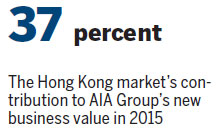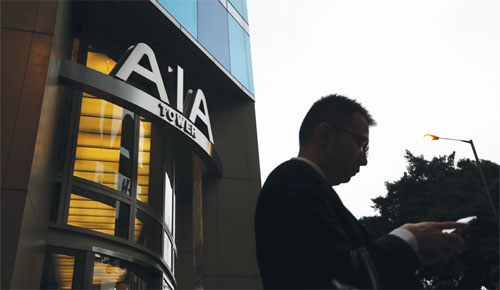AIA growth cushions 22% profit plunge
Updated: 2016-02-26 09:11
By Emma Dai in Hong Kong(HK Edition)
|
|||||||||
Insurance giant AIA Group saw growth in new business in 2015 beat expectations, cushioning a 22-percent tumble in net profit.
Asia's third-largest insurer said on Thursday it will continue to focus on Asia, adding that the recent capital account control measures on the Chinese mainland will have little impact on its operations.
The value of the group's new business (VONB) rocketed 26 percent on year to $2.2 billion in 2015, beating a 17.4-percent median estimate by seven analysts surveyed by Bloomberg.
The VONB margin widened by 4.6 percentage points to 54 percent compared with a year ago, while total weighted premium income rose by 10 percent to $19.88 billion.
AIA announced a final dividend of 51 Hong Kong cents per share on Thursday - 50 percent higher than a year ago. The move lifted total dividends for 2015 to HK$69.72 per share, representing year-on-year growth of 39 percent.
The insurer's share price picked up 0.89 percent on Thursday to close at HK$39.5 in Hong Kong, despite its net profit tumbling by 22 percent to $2.69 billion last year, while earnings fell by 24 percent to HK$0.22 per share. The city's benchmark Hang Seng Index slipped 1.58 percent.
Amid volatility in regional currencies and potential further US interest-rate hikes, AIA Chief Executive Mark Tucker said the group will remain focused on existing Asian markets, which have business drivers like "demographics, savings rate, penetration rate, increasing middle-class upon urbanization" in place.

According to Tucker, Hong Kong is the group's largest market and contributed 37 percent of new business value last year, with 90 percent of the policies sold backed by US dollar assets.
In other Asian markets, policies sold in local currencies are backed by assets in the same currency. "The only (currency) exposure is in the dividends, which is hedged," he said.
John Chu Tai-wo, a director of AIA Group, said the mainland authorities' efforts to curb capital outflow are not likely to affect the group's Hong Kong operations, as the number of policy buyers who need to make big-ticket payments through UnionPay is "not material".
"Mainland policy holders account for just one-third of our annualized new premium (ANP) in Hong Kong, which is again a third of the group's ANP," Chu said.
"Besides, most of these policies are paid by installments. Big-ticket payments are usually made through methods other than UnionPay, such as bank draft. So, the influence of the UnionPay cap is rather limited."
UnionPay International - a subsidiary of UnionPay, the mainland's national bankcard association - has reportedly strengthened enforcement of the $5,000 cap on each payment made overseas on debts and credit cards.
Coming into effect from Feb 4 this year, the new rule is said to affect sales of insurance policies in Hong Kong, which is believed to be a channel for cross-border asset flow.
emmadai@chinadailyhk.com
|
AIA chiefs believe that UnionPay's new rule of a $5,000 cap on each payment made overseas on debts and credit cards will not dim the company's attraction to mainland clients. Roy Liu / China Daily |
(HK Edition 02/26/2016 page8)
